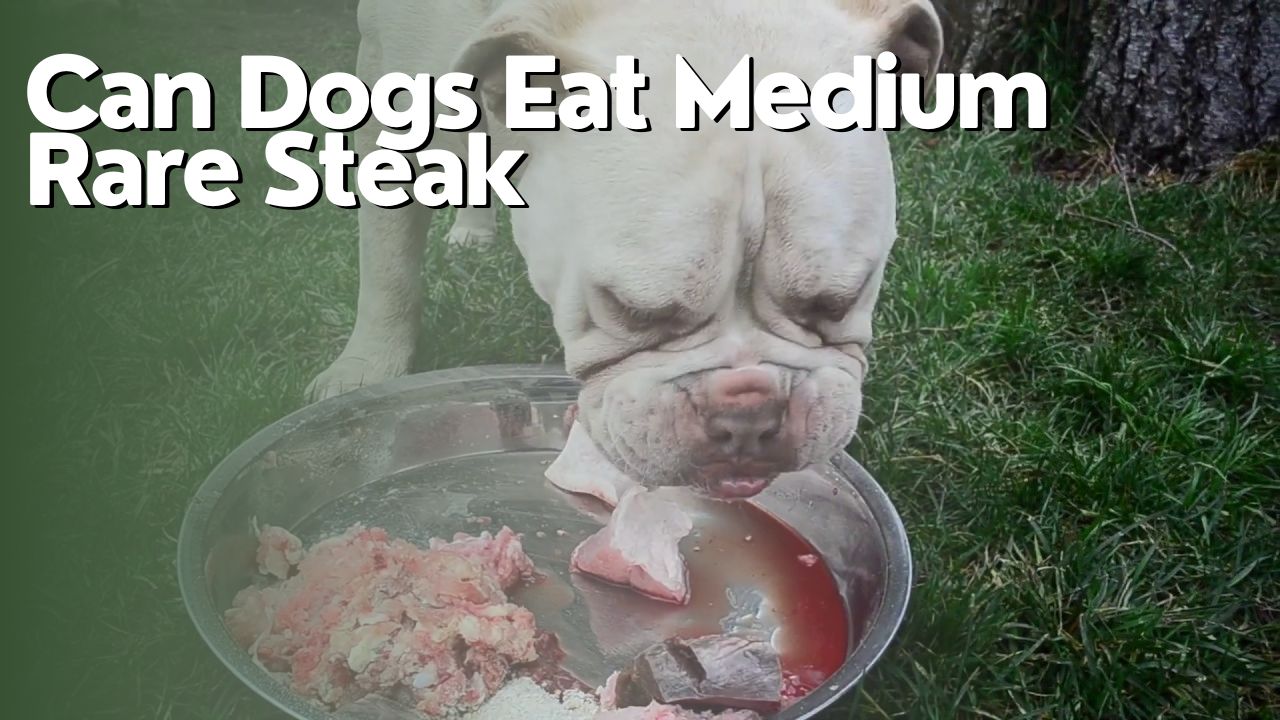As a dog owner, I often find myself wondering what foods are safe for my furry friend. One question that frequently comes up is whether dogs can indulge in some medium rare steak. After all, it’s hard to resist those pleading eyes when enjoying a juicy steak yourself.
In this article, we will explore the topic of dogs and medium rare steak, diving into their digestion process, safe cooking practices, alternative diet options, and the importance of consulting with a veterinarian.
Let’s ensure our four-legged companions are happy and healthy!
Understanding Canine Digestion
Can dogs digest medium rare steak? As a dog owner, I’ve always wondered about this.
To understand if dogs can handle medium rare steak, it’s important to look at their digestion process.
Dogs have a shorter digestive tract compared to humans, which means their food moves through their system quicker. They also have a higher stomach acidity, which helps break down proteins efficiently.
However, feeding dogs raw or undercooked meat can come with risks.
Raw or undercooked meat can contain harmful bacteria like Salmonella or E. coli, which can cause digestive upset, diarrhea, or even more severe illnesses. While dogs have a stronger immune system than humans, they are not completely immune to these bacteria. This is why it’s generally recommended to cook meat thoroughly before feeding it to dogs.
If you really want to give your dog a taste of steak, it’s best to cook it well-done. This ensures that any potential bacteria are killed off, reducing the risk of digestive issues. It’s also important to avoid seasoning the steak with ingredients like garlic or onions, as these can be toxic to dogs.
Always consult with your veterinarian before introducing new foods into your dog’s diet.

Medium Rare Steak and Dogs
Try giving your furry friend a slightly pink cooked piece of beef. As a dog owner, you may be wondering if it is safe for your canine companion to indulge in a medium rare steak. While dogs are primarily carnivorous animals, it is important to consider their digestive system before feeding them any type of food.
Canine digestion differs from humans in several ways, including the length of the digestive tract and the presence of certain enzymes.
When it comes to medium rare steak, it is generally not recommended to feed it to your dog. The reason behind this is the potential risk of bacterial contamination, especially with undercooked meat. Dogs can be susceptible to foodborne illnesses caused by bacteria such as Salmonella or E. coli, which can be present in raw or undercooked meat. These bacteria can cause gastrointestinal issues and other health problems in dogs.
To ensure the safety of your furry friend, it is best to fully cook the steak before offering it to them. Cooking the meat thoroughly will help eliminate any harmful bacteria and reduce the risk of food poisoning. Additionally, it is always a good idea to consult with your veterinarian before introducing any new foods into your dog’s diet. They can provide guidance on the best dietary choices for your specific dog based on their individual needs and health.
Safe Cooking Practices for Dogs
To ensure your furry friend’s safety, it’s important to cook their food thoroughly and follow safe cooking practices. When it comes to cooking for my dog, I always make sure to follow these guidelines:
- Cook meat thoroughly: Dogs are susceptible to bacteria like Salmonella and E. coli, so it’s crucial to cook their food at the right temperature. Make sure the internal temperature of the meat reaches at least 165°F (74°C) to kill any harmful bacteria.
- Avoid seasoning: While medium rare steak may be tempting for us humans, it’s best to avoid seasoning your dog’s food. Spices like garlic, onions, and salt can be toxic to dogs and may lead to health issues.
- Remove excess fat: Trim off any excess fat from the meat before cooking it for your dog. Too much fat can cause digestive problems and lead to pancreatitis in dogs.
- Let it cool: Before serving the cooked meat to your dog, allow it to cool down. This not only prevents burns but also helps to eliminate any bacteria that may have survived the cooking process.
Remember, your dog’s health and well-being should always be a priority. By following safe cooking practices, you can ensure that their meals are both delicious and safe.
Alternative Options for Canine Diets
When it comes to feeding our furry friends, it’s important to provide them with balanced and nutritious dog food options. This ensures that they are getting all the essential nutrients they need to thrive.
Additionally, incorporating safe and healthy proteins into their diet can help support their muscle development and overall health.

Balanced and nutritious dog food options
You should consider balanced and nutritious dog food options for your furry friend. While it may be tempting to share your medium rare steak with your dog, it’s important to prioritize their health and well-being.
There are several high-quality dog food brands available that provide all the essential nutrients your dog needs. Look for options that contain real meat as the first ingredient, as this will provide them with the necessary protein. Additionally, opt for brands that include a variety of fruits, vegetables, and whole grains to ensure a well-rounded diet.
It’s also important to consult with your veterinarian to determine the specific nutritional needs of your dog based on their age, size, and activity level. Remember, investing in a balanced and nutritious dog food will contribute to their overall health and happiness.
Incorporating safe and healthy proteins into your dog’s diet
Consider incorporating safe and healthy proteins into your furry friend’s diet to ensure their overall well-being. When it comes to proteins, there are plenty of options that can provide your dog with the necessary nutrients.
Here are a few ideas to get you started:
- Chicken: A lean and easily digestible protein source, chicken is a popular choice for many dogs.
- Fish: Rich in omega-3 fatty acids, fish can help promote a healthy coat and support joint health.
- Eggs: Packed with essential amino acids, eggs are a great protein option for dogs.
By incorporating these safe and healthy proteins into your dog’s diet, you can help them maintain a balanced and nutritious meal plan. Just remember to consult with your veterinarian to determine the appropriate portion sizes and ensure that your dog’s specific dietary needs are being met.
Consulting with a Veterinarian
If in doubt, it’s best to consult with a veterinarian about whether dogs can eat medium rare steak. While it may be tempting to share a juicy piece of steak with your furry friend, it’s important to consider their specific dietary needs and potential health risks. A veterinarian will be able to provide you with the most accurate and up-to-date information regarding what is safe and healthy for your dog to eat.
When it comes to feeding your dog, protein is an essential component of their diet. However, it’s crucial to choose safe and healthy sources of protein. While medium rare steak may seem like a tasty option, it can pose certain risks. Raw or undercooked meat can contain harmful bacteria such as Salmonella or E. coli, which can cause food poisoning in both humans and dogs. These bacteria can lead to symptoms like vomiting, diarrhea, and even more serious complications.
By consulting with a veterinarian, you can ensure that your dog is receiving the right balance of nutrients and that their diet is safe and appropriate for their individual needs. They can provide guidance on the best sources of protein for your dog, whether it’s through commercial dog food or homemade meals. Remember, the health and well-being of your furry friend should always come first, so consult with a professional to make informed decisions about their diet.
Frequently Asked Questions
Are there any health risks associated with feeding medium rare steak to dogs?
There may be health risks associated with feeding dogs medium rare steak. It could contain harmful bacteria that can cause food poisoning or other digestive issues. It’s best to consult with a veterinarian to ensure your dog’s safety.
Can dogs eat steak bones?
Dogs can eat steak bones, but there are risks. Bones can splinter and cause choking or internal damage. It’s safer to give them raw bones specifically designed for dogs to chew on.
What are some signs of food poisoning in dogs after eating medium rare steak?
Some signs of food poisoning in dogs after eating medium rare steak include vomiting, diarrhea, abdominal pain, and lethargy. It’s important to monitor their symptoms and contact a veterinarian for proper guidance and treatment.
Can dogs eat other types of meat cooked to a medium rare temperature?
Yes, dogs can eat other types of meat cooked to a medium rare temperature. However, it’s important to note that proper cooking is crucial to ensure the meat is safe for them to consume. Always consult with a veterinarian for specific dietary recommendations.
Is it safe to feed medium rare steak to puppies?
Feeding medium rare steak to puppies is not safe. Their immune systems are still developing and they are more susceptible to foodborne illnesses. It’s best to stick to fully cooked meat for their safety.
Conclusion
In conclusion, while dogs may be able to eat medium rare steak, it’s not recommended due to the potential health risks. Canine digestion is different from humans, and undercooked meat can lead to bacterial infections and digestive issues.
It is important to prioritize the safety and well-being of our furry friends by following safe cooking practices and considering alternative options for their diets. Consulting with a veterinarian is always the best course of action to ensure the health and happiness of our beloved pets.


